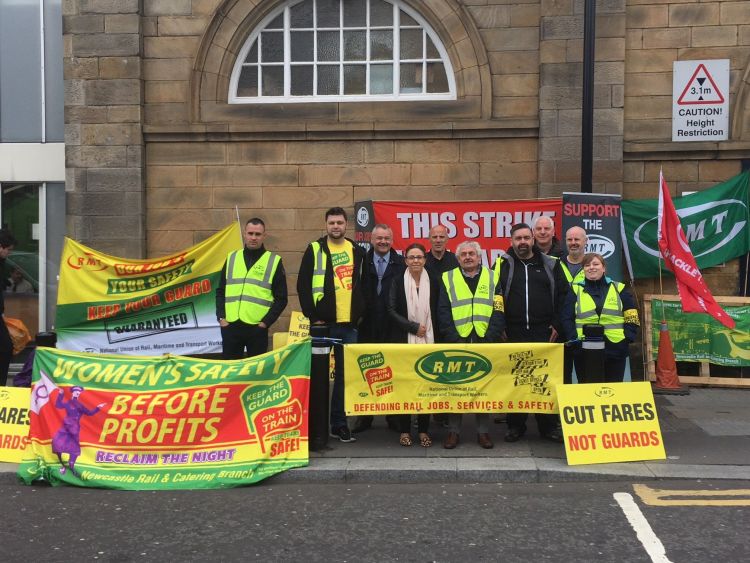Why Northern TUC is supporting RMT's strike to keep guards on Northern Rail

Arriva Rail North is planning on removing guards from a minimum of 50% of its train journeys.
These proposals would mean nearly half a million trains a year running on Northern without the safety guarantee of the second, safety-critical member of staff on board.
Similar moves to extend driver only operations are happening across the whole rail network – driven by government cost cutting, delivered through franchising.
The Northern TUC fully supports RMT members striking to keep safety critical guards on the Northern Rail.
Today I joined RMT at Arriva Rail North on their 19th day of industrial action.
They have shown extraordinary resilience and determination in the fight for rail safety, and it was apparent today that there was strong public support and understanding for colleagues taking action to protect passenger safety.
The RMT have been able to negotiate agreements in Wales and Scotland that lock in the guard guarantee, but they say that they are being blocked from reaching the same settlement across the North of England.
We’ve long argued that we need a properly staffed railway to protect passenger safety and personal security, to help ensure access for all and to promote inclusion.
At a time when unwanted sexual behaviour and assaults on passengers and the public are increasing on public transport, train companies should not be cutting staff or extending driver only operations.
According to a survey for End Violence Against Women by YouGov (2016), 55% of women said that they avoided using public transport and took a taxi to stay safe when out in the evening.
When asked what should be done about sexual harassment in public places, 38% stated that there should be more transport staff.
More generally, abuse and assaults experienced by passengers/public on trains is at a 10-year high.
Passengers with disabilities have also expressed the importance of staff on trains and at stations.
A Survation survey for Action for Rail in 2013 found that some of the main benefits of staff on trains are enhancing personal security and safety (93%) and help with getting on and off trains (73%). At stations, some of the main benefits are
- enhancing personal security and safety (61%),
- providing travel information (60%).
Nearly one quarter of those surveyed (23%) said they sometimes or often feel unsafe and threatened on trains, and 29% said the same for stations.
Shockingly, over a quarter (27%) had experienced a hate crime and/or abuse on a train or at a station – a number that rose to 43% for wheelchair users.
Clearly, we still have some way to go to make the rail network safe and accessible.
The loss of staff on trains would make travel difficult for 75% of the passengers surveyed, while the loss of staff at stations would make it difficult for 81%.
But ultimately the government need to take our railways back into public hands.
That will stop hundreds of millions being siphoned off by private rail firms, and allow us to really put passengers first.
That's why we're encouraging MPs to support this Early Day Motion calling on the Government to launch an urgent inquiry into the crisis at Northern Rail.
Stay Updated
Want to hear about our latest news and blogs?
Sign up now to get it straight to your inbox
